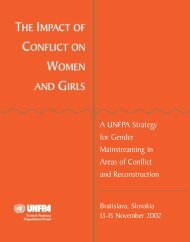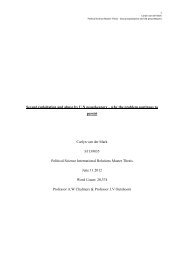Stop Sudah English-revised-March2012 - International Center for ...
Stop Sudah English-revised-March2012 - International Center for ...
Stop Sudah English-revised-March2012 - International Center for ...
Create successful ePaper yourself
Turn your PDF publications into a flip-book with our unique Google optimized e-Paper software.
shown respect <strong>for</strong> human rights” (considering, point f). This law was passed as an ef<strong>for</strong>t to en<strong>for</strong>ce the<br />
basic rights of indigenous Papuans through affirmative action, protection, and empowerment. In particular,<br />
Article 47 states that the government has an obligation to promote, empower, and protect women as well as<br />
men so that there is gender equality. There are four important breakthroughs: 1) the Province of Papua has<br />
authority in all areas of government, except authority in the fields of <strong>for</strong>eign policy, defense and security,<br />
monetary and fiscal matters, religion, and the judicial system; 2) strategic positions such as governor must<br />
filled by indigenous Papuans; 3) establishment of the MRP with representatives from traditional cultural,<br />
religious, and Papuan women’s groups whose duties include, among others, channeling the aspirations and<br />
complaints of indigenous peoples, religious communities, women, and society in general that relate to the<br />
rights of indigenous Papuans, and facilitate follow-up on settlements; and 4) as much as 70-80% of income<br />
from natural resources in Papua is to be enjoyed in Papua.<br />
However, in reality Law No. 21 of 2001 was not implemented consistently. In January 2003, President<br />
Megawati Sukarnoputri issued a decision to divide Papua into two provinces, an action contrary to the spirit<br />
of Law No. 21 that is based on the unity of indigenous Papuans in one undivided Papua Province. The<br />
inconsistency of the central government caused the people of Papua, together with the Papua Traditional<br />
Council, on August 12, 2005 to “return” Act 21 of 2001 to the Indonesian government through the Papuan<br />
House of Representatives (DPRP) that was marked by delivery of a casket. At the same time, the presence<br />
of security <strong>for</strong>ces along the border and in regions where mining, plantation, and timber industries are<br />
located, stirred up conflict and increased incidents of violence, especially in carrying out security operations<br />
to quell the OPM, that continued to erupt in the era of Special Autonomy in Papua. Thus the Papuan<br />
people made a joke: “there is no Special Autonomy, just an Autonomous Case” (in Indonesian, the word<br />
khusus or special and kasus or case sound similar).<br />
Even with the re<strong>for</strong>ms of the post-New Order era and Papua’s status as a region of Special Autonomy, the<br />
security situation is still not conducive, so that until now security operations continue in various regions of<br />
Papua.<br />
ENOUGH IS ENOUGH! 8




![IANSA [PDF, 2MB] - PeaceWomen](https://img.yumpu.com/25206379/1/190x123/iansa-pdf-2mb-peacewomen.jpg?quality=85)
![Commitments Sample [PDF, 93KB] - PeaceWomen](https://img.yumpu.com/25206331/1/190x245/commitments-sample-pdf-93kb-peacewomen.jpg?quality=85)










![A Toolkit for Advocacy and Action [PDF, 260KB] - Peace Women](https://img.yumpu.com/25205989/1/190x245/a-toolkit-for-advocacy-and-action-pdf-260kb-peace-women.jpg?quality=85)